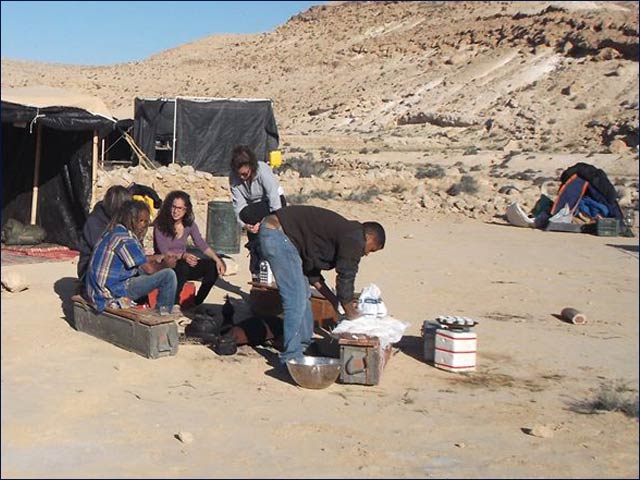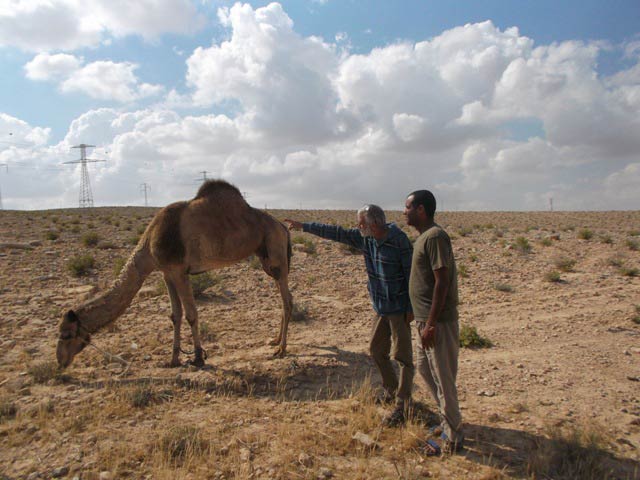For the past three years, Israeli Desert owners Ronnie Michal and Salaam Aloag have been operating a unique project that immerses guests in a complete desert experience. This includes sleeping outdoors in Bedouin tents in the heart of the wilderness, camel and donkey treks, Jeep tours, workshops on desert wisdom and basic skills, stargazing and even meals that combine ethnic Bedouin cooking with modern cuisine.
"It turns out that my collaboration with Salaam has turned out to be something unique," says Ronnie Michal.
Ronnie notes that he and Salaam inspire each other with their knowledge and experience.
"Our idea is to introduce people to the story from the moment they enter the desert with us. The story aims at satisfying people's curiosity regarding the desert realm," says Ronnie. "The project is based on good times! People like to connect to the desert in Bedouin style," Salaam points out. His wife, Najah, operates the khan with an iron fist while simultaneously encouraging traditional crafts initiatives. Salaam adds: "Many guests enjoy our lecture on The Wisdom of the Desert." The lecture includes an explanation how the Bedouin learn to live in desert conditions, including the use of plants, water storage, etc."
From TV and microwave to tent and campfire
The desert seems mysterious and charming to people from modern Western cultures, a fact that inspires guests to return to a state of primordial consciousness: "We make desert culture accessible to people who have never known the desert and its harsh living conditions. We take tourists and Israelis alike, and bring them into the wilderness for a lasting experience. Our tent is typically Bedouin, and people, young and old, sleep on a mattress. All participate in this unique experience" Ronnie explains.
In response to a question what changes he would like to instill in visitors, Ronnie replied: "We are not 'traders' of change. We provide an experience that allows Israelis and tourists, Jews, Muslims and Christians, to return home with more answers and many more questions that are the result of their unique experience that connects them to the country and the desert."
 Tourists and locals interacting at the campsite.
Tourists and locals interacting at the campsite.
Photo courtesy of Israeli Desert.Politics
"Political issues overshadow the lifestyle of the inhabitants of the desert," Ronnie explains. He is referring mainly to the programs of the Bedouin Negev Settlement Authority. Ronnie explains that the media concentrates on depicting Bedouin protests against proposals submitted by the Bedouin Negev Settlement Authority, and does little to voice the assent of those wishing to reach an agreement.
I came to Salaam and asked him: "What is this thing with the Palestinian flag?" "It's not ours," he replied. "Put an Israeli flag at the entrance to your campsite," I told him.
So during the Passover vacation period, all the campsites along the Negev Highlands on Highway 40 proudly displayed the Israeli flag. During the Passover break, the Har Hanegev Regional Council instituted an Open Day aimed at the Israeli public, which attended the Bedouin encampment en masse.
Salaam: "If we let the children live together today, they will have a more enriching living experience than we do. The will have an awareness of how to live together and cooperate. For a Bedouin, it is disastrous to be disconnected from the state. I work extensively with the Ben Gurion Heritage Center. They host IDF soldiers and officers who have many questions about current Bedouin life. We are happy to have this dialogue, because we Bedouin view ourselves as part of the nation and part of the state. "
“In the Bedouin settlement of Avdat, patriotism is crazy," Ronnie says.
 Ronnie and Salaam in the wilderness.
Ronnie and Salaam in the wilderness.
Photo courtesy of Israeli Desert.Salaam: "I am part of the State of Israel and my father and grandfather gave their lives to the state. We decided that we wanted to demonstrate against the continuous white line dividing the road, and organized a protest against the Ministry of Education's authorization of the white line separator. We recruited the Negev Coexistence Forum to assist our efforts. Among other suggestions, forum members suggested that the local Bedouin should raise Palestinian flags. The local Bedouins opposed this, and raised the Israeli flag instead.”